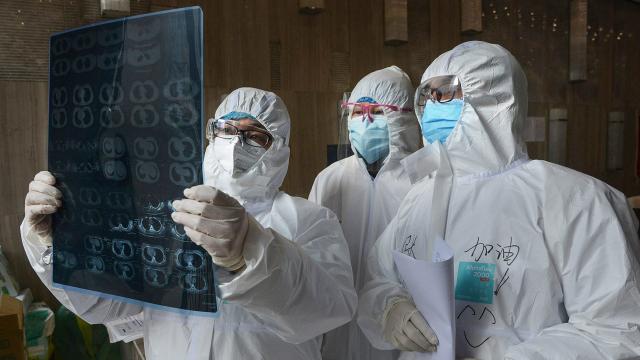A Miami man who felt ill after returning from a business trip to China in January was slapped with a $US3,270 ($4,946) bill after seeking a test to determine if he was infected with the Wuhan coronavirus, the Miami Herald reported on Monday.
According to the Herald, Osmel Martinez Azcue believed it would be irresponsible for him to not alert medical personnel of the possibility he had contracted SARS-CoV-2, the coronavirus behind a disease called COVID-19 that originated in China but has begun spreading globally. The official death toll has now risen to just short of 2,700, with over 80,000 confirmed cases, though the World Health Organisation says it is not (yet) a pandemic. Azcue did not want to contribute to the virus’s spread and told the Herald he went to Jackson Memorial Hospital, where nurses received him wearing protective garments and released disinfectant in his room.
Hospital personnel told Azcue a coronavirus diagnosis would require a CT scan, so he instead opted for a simple flu test. That fortunately confirmed that Azcue had nothing worse than the common flu, but according to the Herald, his insurance provider, National General Insurance, sent him a bill for $US3,270 ($4,946). Hospital staff said it could possibly be reduced to $US1,400 ($2,117), but only if Azcue was able to demonstrate he did not receive the flu from a pre-existing condition. They also said that more bills would be on the way, according to the Herald.
Azcue’s plan wouldn’t have existed if Donald Trump’s administration hadn’t rolled back provisions of the Affordable Care Act (ACA) that prevented insurers from denying coverage over pre-existing conditions or refusing to things like hospitalisation in 2018. The White House added links to the federal ACA exchange to outside sites that sold such “short-term plans,” according to the Washington Post, despite these not meeting the original requirements; that’s in addition to the Trump administration’s other efforts to weaken key provisions of the law or throw it out entirely. Azcue makes $US55,000 ($83,184) a year and took one of those short-term plans to lower his premiums from $US400 ($605) a month to $US180 ($272), according to the Herald.
Incidents of patients receiving enormous medical bills hugely disproportionate to care they received are less an aberration than a hallmark of the for-profit U.S. medical system—and such surprises can hit even those with substantive insurance if they happen to be unlucky enough to end up at an out-of-network provider or the insurer finds an arbitrary excuse not to pay. Research in 2019 found that 137 million Americans faced financial hardship from medical bills in the prior year. A more recent study by the NORC at the University of Chicago this month found it was likely that at least eight million Americans have tried to crowdfund for medical bills, while another 12 million had started fundraisers for others. It’s likely that few of these efforts ever raise enough money to cover costs. Around 27.5 million people still lack health insurance as of September 2019, the first time in a decade the number of uninsured has increased.
The possibility of being struck with one of these bills is a major driver in Americans avoiding seeking medical attention for a health issue. Gallup polling in 2019 found that 68 million Americans, or roughly one out of four, had skipped treatment due to costs in the prior twelve months. Set this system on a collision course with a dangerous disease spreading across the world and the outlook isn’t great.
The federal government has said it will pay for costs like mandatory quarantines (which can be extremely expensive) for uninsured individuals returning from China. But in prior situations like the 2014-2016 Ebola outbreak, individuals were still on the hook for bills, and the federal government is already hard pressed to pay for overhead costs of emergency response. Azcue didn’t even have the disease or technically even receive a test for it, making it less likely his costs will be defrayed.
Fear of high medical bills is also a factor in overcrowding in emergency departments across the country, as many people won’t seek treatment until they are obviously ill. If the coronavirus gains a foothold in the U.S., that could contribute to spread in medical settings where SARS-CoV-2 already has a proven ability to spread.
“When someone has flu-like symptoms, you want them to to seek medical care,” Georgetown University professor and Centre on Health Insurance Reforms co-director Sabrina Corlette told the Herald. “If they have one of these junk plans and they know they might be on the hook for more than they can afford to seek that care, a lot of them just won’t, and that is a public health concern.”
Azcue told the Herald, “How can they expect normal citizens to contribute to eliminating the potential risk of person-to-person spread if hospitals are waiting to charge us $US3,270 ($4,946) for a simple blood test and a nasal swab?”
